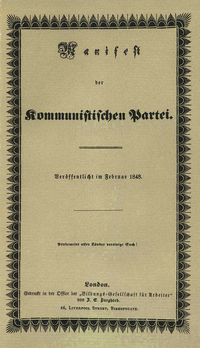
Back Kommunistiese Manifes Afrikaans Manifest der Kommunistischen Partei AN بيان الحزب الشيوعي Arabic المانيفيستو الشيوعى ARZ Manifiestu comunista AST Kommunist Manifesti Azerbaijani کومونیست مانیفستی AZB Маніфест камуністычнай партыі Byelorussian Маніфэст камуністычнай партыі BE-X-OLD Манифест на Комунистическата партия Bulgarian
This article needs additional citations for verification. (February 2018) |
 First edition in German | |
| Author | |
|---|---|
| Translator | Samuel Moore |
| Language | German |
| Genre | Philosophy |
Publication date | 21 February 1848 |
| Publication place | United Kingdom |
| Text | The Communist Manifesto at Wikisource |
| Part of a series on |
| Marxism |
|---|
The Communist Manifesto (German: Das Kommunistische Manifest), originally the Manifesto of the Communist Party (Manifest der Kommunistischen Partei), is a political pamphlet written by Karl Marx and Friedrich Engels, commissioned by the Communist League and originally published in London in 1848. The text is the first and most systematic attempt by Marx and Engels to codify for wide consumption the historical materialist idea that "the history of all hitherto existing society is the history of class struggles", in which social classes are defined by the relationship of people to the means of production. Published amid the Revolutions of 1848 in Europe, the manifesto remains one of the world's most influential political documents.
Marx and Engels combine philosophical materialism with the Hegelian dialectical method in order to analyze the development of European society through its modes of production, including primitive communism, antiquity, feudalism, and capitalism, noting the emergence of a new, dominant class at each stage. The text outlines the relationship between the means of production, relations of production, forces of production, and the mode of production, and posits that changes in society's economic "base" affect changes in its "superstructure". Marx and Engels assert that capitalism is marked by the exploitation of the proletariat (working class of wage labourers) by the ruling bourgeoisie, which is "constantly revolutionising the instruments [and] relations of production, and with them the whole relations of society". They argue that capital's need for a flexible labour force dissolves the old relations, and that its global expansion in search of new markets creates "a world after its own image".
The Manifesto concludes that capitalism does not offer humanity the possibility of self-realization, instead ensuring that humans are perpetually stunted and alienated. It theorizes that capitalism will bring about its own destruction by polarizing and unifying the proletariat, and predicts that a revolution will lead to the emergence of communism, a classless society in which "the free development of each is the condition for the free development of all". Marx and Engels propose the following transitional policies: the abolition of private property in land and inheritance; introduction of a progressive income tax; confiscation of rebels' property; nationalisation of credit, communication, and transport; expansion and integration of industry and agriculture; enforcement of universal obligation of labour; and provision of universal education and abolition of child labour. The text ends with three decisive sentences, reworked and popularized into the famous call for solidarity, the slogan "Workers of the world, unite! You have nothing to lose but your chains".